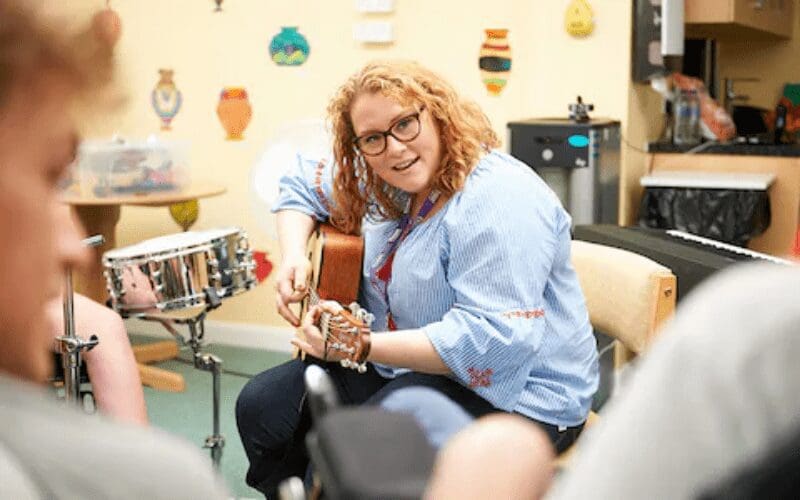Art is one of the defining characteristics of what it means to be human. It’s no surprise that engaging in the creative arts helps us to express and process our feelings. Leading to better mental health and the ability to better manage the stresses of modern life. It is from this basis that the concept of a music therapist has developed with more and more people turning to the arts as therapy.

In this article, we will explore the role of a music therapist. As well as look into the requirements and process of how to become a music therapist.
Stay tuned for everything you need to know!
What Is A Music Therapist?

A music therapist is part of an employment subgroup of creative arts therapists who use the arts to treat mental illness.
They provide support for individuals with disabilities, and to promote wellness and personal growth, and creativity.
What Does A Music Therapist Do?

If you’re wondering “what does a music therapist do on a daily basis?”, the main focus of the role is to create a safe and supportive environment. Within which clients can express themselves through sound and music.
In terms of music therapist job description, it also involves helping clients develop insight and find ways to relate to others. Or, develop an awareness of their own feelings, through to helping them bring about positive change in their lives.
Day to day, you might be working in groups or with individuals who have learning disabilities, mental health problems, speech and language difficulties, or an injury or illnes. It can be challenging, but also very rewarding.
What Do Music Therapy Sessions Involve?

Like in other forms of therapy, the process begins with a client assessment to evaluate needs and strengths. They define the goals and objectives of a treatment plan. This might result in pivoting away from music therapy as a discipline if the therapist feels a better approach might be another form of art therapy.
From there, music therapy sessions can include listening, playing an instrument, interpreting, songwriting, musical entertainment, or just about any kind of engagement with music. As sessions progress, the therapist will be required to write case notes and make evaluations of the effectiveness of the therapy.
Music therapy sessions can take place in a therapy clinic, as well as in prisons, schools, and hospitals. In the UK, music therapy is available on the NHS.
Often, music therapists are employed by the health service or by private therapy. But, it is also possible to be freelance and work for a mixture of service providers, both public and private. Or eventually, starting your own practice or moving into teaching.
How To Become A Music Therapist
Are you looking for music therapy jobs and want to know how to become one? Firstly, being a music therapist requires that you need to be registered with a regulatory body.
In the UK, the certification board for music therapists is the HCPC (Health and Care Professions Council). The pre-requisites of membership is the successful completion of approved post-graduate education and training courses specifically in music therapy.
Moreover, the term ‘music therapist’ is actually protected by law. Therefore, only registered practitioners can describe themselves as such.
Can You Be A Music Therapist Without A Degree?

Generally speaking, the majority of music therapists are music graduates. If you’re not a music graduate, you’re required to have an undergraduate degree or professional qualification in a relevant field.
There are some who enter the profession with a degree or professional qualification in psychology, social care, or education. This is provided they can also demonstrate a high level of musical proficiency.
We go into a bit more about the education requirements below.
Music Therapist Education Requirements
For this job role, you will need to complete a Masters Degree in Music Therapy or a Level 7 Apprenticeship for Arts Therapists through the NHS.
The following institutions have been approved by the HPCP to offer a masters degree in music therapy:
- Anglia Ruskin University
- Guildhall School of Music and Drama
- Nordoff Robbins
- Queen Margaret University
- Roehampton University
- University of South Wales
- University of West of England
Once the qualifications are complete, you can register with the HCPC and officially become a music therapist.
Music therapy is an incredibly demanding role, both in terms of musicality and in terms of your skills as a therapist. Therefore, having a strong educational background both in music and in therapy is very important in ensuring you have the right skills for the role.
Furthermore, the stringent qualification process for the role maintains the quality of music therapists delivering therapy to the public.
How Long Does It Take To Become A Music Therapist?

In total, the process will take around 7-9 years.
This is comprised of an undergraduate degree (typically 3 years) and 1-2 years of paid or voluntary work. Followed by a masters degree/level 7 apprenticeship.
Music Therapist Salary

The average salary for music therapists in the UK is between £30,000 and £45,000 per year.
Of course, senior professionals who own their own practice or manage teams can earn more than that as their career develops.
Our Final Thoughts

The process is long and quite difficult, but for those that have a passion for music and the arts and a passion for helping others then it is a wonderful career option where you can really make a difference in people’s lives.
Using music as a relaxation technique, individual, or group intervention can bring desired changes in terms of cardiac functioning, blood pressure levels, and overall body functions. Whether you are an active listener or an active performer, music, in any form, will change your life for the better.
We hope that you found this article helpful! Do you work within music therapy? Let us know your experiences in the comments below! Also, don’t forget to share this guide across your socials and tag us @musicgateway!



